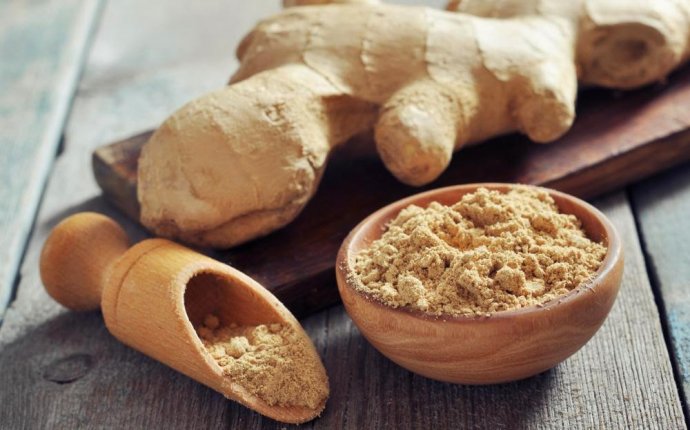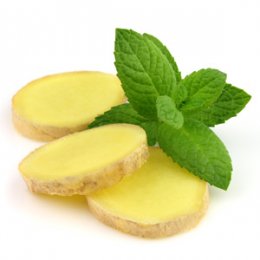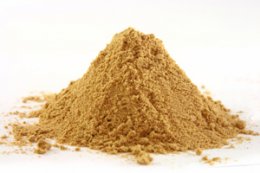
Ginger Ayurveda
 Ginger is a tonic and stimulant. It is known to help reduce fever and cleanse the body of toxins. It also has blood thinning properties, inhibits cell-clotting enzymes in your blood stream, lowers cholesterol, and reduces migraine headaches. And, it does a better job at preventing and treating these dis-eases than aspirin (which is said to cause stomach problems and bleeding). Ginger is also a great detoxifier and alkalizer (as opposed to acidic, diseases such as cancer cannot survive in an alkaline body). And finally, ginger helps with nausea, morning sickness, cramping, and sea sickness.
Ginger is a tonic and stimulant. It is known to help reduce fever and cleanse the body of toxins. It also has blood thinning properties, inhibits cell-clotting enzymes in your blood stream, lowers cholesterol, and reduces migraine headaches. And, it does a better job at preventing and treating these dis-eases than aspirin (which is said to cause stomach problems and bleeding). Ginger is also a great detoxifier and alkalizer (as opposed to acidic, diseases such as cancer cannot survive in an alkaline body). And finally, ginger helps with nausea, morning sickness, cramping, and sea sickness.
Ginger comes in two main types: fresh or dry.
Fresh ginger is a root which, when sliced open, reveals a fresh, tangy and spicy flesh.
Dry ginger is basically a dried up ginger root that has been ground into a thin powder. Fresh powder tends to be yellowish, while it whitens as it gets older. The two are assimilated differently into the body. In Ayurveda, fresh ginger is used for digestion and nausea, while powder ginger is used for colds and respiratory illnesses.
Whether I boil fresh ginger to make a soothing tea or whether I make a cold-killing concoction with ginger powder, I know I won’t be sick over the holidays. This is my personal remedy to avoid getting sick when I feel something coming on:
Fill a large glass of boiling water. Add one heaping teaspoon of organic ginger powder (or as much as you can handle). Squeeze half a lemon, stir and drink up! You may also add some raw honey to taste (do not cook the honey, or it will become toxic to the body). It may make your throat tingle, but it’s worth it! This power tea will help reinforce your immune system and help clear your lung and chest area. And, since ginger is a sweat-inducing spice, it can help reduce a fever and expel toxins from the body.
Fresh ginger is great for Kapha types because it is a pungent spice, it stimulates the system and helps decrease Kapha. It is also Vata-pacifying and aids with digestion. An Ayurvedic doctor once told me that drinking ginger tea before eating a meal will help your taste buds naturally select foods that your body needs at that moment.
Take a piece of fresh ginger root and slice it with the skin still on. Then, boil it in water for 10 to 20 minutes (you can add more water as the water level decreases). Sift the tea as to not get ginger chunks in your tea cup and sip away. You can drink this version of the tea every day before meals to help you choose your foods wisely and to open up the appetite, or after meals to help you digest.
 Ginger improves and reinforces the healing properties of other herbs. What more could you possibly want? Ginger is your first step to a healthy, balanced body.
Ginger improves and reinforces the healing properties of other herbs. What more could you possibly want? Ginger is your first step to a healthy, balanced body.
Ayurveda gives ginger the status of a virtual medicine chest. That’s because this wonder spice has time-tested digestion-friendly properties, in addition to its numerous other health benefits.
In India, we use ginger liberally in our daily life. Ginger-spiked chai is a household favorite, and it’s grandma’s antidote of choice for battling cold and flu.
On millions of dining tables in India, you’ll see matchsticks of fresh ginger that have turned a soft pink from being soaked in lemon juice and salt: a zingy accompaniment to our favorite dinner, dal-chawal.
Let’s give this knobbly root a closer look.
10 Terrific Benefits of Ginger
- Haven’t been feeling hungry? Eat fresh ginger just before lunch to stoke a dull appetite. (Ayurveda recommends that lunch should always be your main meal of the day, because this is when your digestive energy is naturally at its peak).
- Ginger improves the absorption and assimilation of essential nutrients in the body.
- Ginger clears the ‘microcirculatory channels’ of the body, including the pesky sinuses that tend to flare up from time to time.
- Feeling airsick or nauseous? Chew on ginger, preferably tossed in a little honey.
- Can’t stop the toot-a-thon? Gas—oops—guess what?! Ginger helps reduce flatulence!
- Tummy moaning and groaning under cramps? Munch on ginger—for best results, toss it in a little warm ghee before you chew.
- Reeling under joint pain? Ginger, with its anti-inflammatory properties—can bring relief. Float some ginger essential oil into your bath to help aching muscles and joints.
- Got a surgery done? Chewing ginger post-operation can help overcome nausea.
- Stir up some ginger tea to get rid of throat and nose congestion. And when there’s a nip in the air, the warming benefits of this tasty tea are even greater!
- Bedroom blues? Try adding a gingery punch to a bowl of soup. (Psst…the Ayurvedic texts credit ginger with aphrodisiac properties, too!)
3 Ways to Use Ginger
- Ginger & HerbsCook basmati rice. When you take the lid off the pan, quickly stir in finely chopped garlic, ginger, green chillies and fresh cilantro leaves—the burst of flavor and fragrance will drive your senses crazy with desire!
- Ginger In Your Juice‘Grate’ idea: grate some ginger root and put it in your juicer, along with carrots and apples and a little lemon juice. Totally yummy, and of course, so good for you!
- Gingery DessertEven a smidgen of grated ginger on your vanilla pana cotta or strawberry sorbet can wake up the flavor!
Ginger & Health
Ovarian Cancer Treatment
Ginger may be powerful weapon in the treatment of ovarian cancer. A study conducted at the University of Michigan Comprehensive Cancer Center found that ginger powder induces cell death in all ovarian cancer cells to which it was applied.
Maintains Normal Blood Circulation.
Ginger contains chromium, magnesium and zinc which can help to improve blood flow, as well as help prevent chills, fever, and excessive sweat.
Colon Cancer Prevention
A study at the University of Minnesota found that ginger may slow the growth of colorectal cancer cells.
Morning Sickness
A review of several studies has concluded that ginger is just as effective as vitamin B6 in the treatment of morning sickness.














